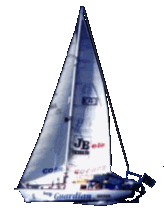|
|
 |
 |
 |
|
|
 |
 |
 |
|
We had drafted this blog when we were still in New Zealand, and it describes events from last December. Unlike most of our blogs, this story is not about us, but about one of our fellow cruisers. During our Pacific crossing, we became friends with the crews on several boats that were traveling at a similar pace. We'd meet them at one part of the journey, and then again at various stops along the trip. Good friendships were developed this way.
One of the boats that we got to know is Guardian, an old wooden
sloop from the Northeast of Brazil. We first met Guardian's crew in Panama. The captain, Joao Sombra de Alberquerque, has written several sailing guides, including one about an earlier circumnavigation, and is well known among sailors in Brazil. He is a warm-hearted fellow, with a grey bearded and ruddy features that would have enabled him to fit right in with Columbus' crew. We spent an evening with Joao over dinner at the Balboa Yacht Club, as he shared insights on the best route across the Pacific. Sima became good friends with a crew member, Rafaella, who was on her very first open ocean passage. Her husband, Manual, taught Sima how to make sushi. And another crew member, Juarez spent two days with Paul doing boat repairs. Juarez was a genius with things mechanical and electrical, and helped us speed through a number of projects, without speaking a lick of English. As of the time of our arrival in New Zealand, we had last seen Guardian in Bora Bora. Joao told us that he would be sailing to Australia. His crew, Juarez, Manual, and Rafaela had returned to Brazil, and Joao was alone with a film crew that was preparing a documentary for Brazilian TV. We hadn't realized that the film crew would soon be leaving, and that he would be single-handing the boat for the long and tricky trip to Australia. Early in the morning of December 17, we were stunned to hear on the radio that a boat named Guardian was being towed to the quarantine dock here in Opua, New Zealand, after having been dismasted at sea. At the marina office, we learned that Joao's dismasting had already been the stuff of headlines in the New Zealand newspapers.
We met Joao after he cleared customs. He needed to move his boat
into a more permanent berth, but had no fuel and his engine was not
working anyway. A tow boat was arranged, and we helped move the boat
to a permanent berth.
Joao looked fine, and was surprisingly upbeat and in good spirits after his ordeal. We helped him settle in, and invited him over to Leander for dinner that night. At dinner, Joao told us what had happened. He had left Nuku'Alofa in Tonga on December 6, five days after we had. He had decided not to go to Australia, because it was too late in the season to make the longer trip. The first couple of days were fine, he said, with good winds on the beam, but then died completely by about the third day, and stayed that way for the next five days. He kept full sail up, and motored a little, needing to conserve fuel for the long trip. Then, late one night, the winds came up suddenly to 40 knots, catching him unawares. He immediately sheeted out the main sail and the jib, and went about trying to get the main sail down to its second reef. It was hard work, he said, because the seas had also come up. While trying to get the sail down, a wave hit the side of the boat forcefully. At the same time, the boom pivoted, and knocked him off of his feet, and into the water. He had a safety harness on, and tether, but it had about 30 yards of line. He was a long way from his boat, in the open ocean, by himself, in high winds and heavy seas. The water was shockingly cold. Joao had several layers of cloths on. He began to try to get back to the boat, but that was difficult to do. The boat was sailing at about five knots, dragging him through the rollers. Joao began to pull himself back to the boat, hand over hand, so that he could climb back aboard. It was a hard struggle, he said, but he eventually got to within striking distance, and tried to reach for the boarding ladder as the boat pitched in the sea. But he couldn't get a good grip on the ladder, and a wave knocked him back to the full length of his tether. He tried again, but the same thing happened, and he was knocked back again thirty yards away from the boat. He collected himself, and began a third attempt, and failed again. And then on six more attempts. After what he estimates as about fifteen minutes in the cold water, on the tenth attempt, he grabbed the ladder, and pulled himself aboard. He climbed into the cockpit, shaking and, most likely, in somewhat of a shock. How fast was the boat going, I asked. Six, seven, eight knots? "No, only four knots or less. Six knots, I die." As Joao sat trying to recover in the cockpit, he heard a loud snap, and looked up to see that the mast had snapped and was falling into the sea. . The sustained 40 knots had caught the billowing, half-reefed sail, and the wooden mast snapped just above the gooseneck fitting, where the boom is attached to the mast. The collapsing mast took with it the main sail and jib, the boom, and all the standing and running rigging. Joao saw that there was not much that he could do in his exhausted state. He determined that the submerged rig was not a threat to puncture a hole in the hull, and was acting like a giant sea anchor keeping the boat relatively stationary in the water. Joao went below, and stripped off his soaking clothing, and put on warm clothes. With little fuel, and no way of making headway, Joao knew that he needed help. He has a "SPOT' GPS position device, but it had not seemed to work for many months, and was not operable that night. He looked about the boat and found his Emergency Positioning Indicating Radio Beacon ("EPIRB"). By coincidence, he had purchased it eleven years ago during his first circumnavigation in, of all places, New Zealand. Joao said that back then, NZ required all boats to be equipped with certain safety gear before leaving New Zealand, including an EPIRB. Joao had purchased it for $50 NZ, but had never used it. In fact, several years earlier, he had thought of removing it from the boat, and he claimed that he never replaced the battery, had it inspected, nor tested it. On this night, he pulled the activation switch and, after having sat on the shelf for eleven years, the EPIRB lit up to indicate that it was transmitting and did, in fact, transmit. NZ maritime officials picked up his distress signal at 11 p.m. on December 11. According to the newspaper, a fixed wing plane was sent out, saw the boat's lights, but was unable to do anything further because of a sea mist. Joao, for his part, wrapped himself in three blankets, and went to sleep.
The plane returned the next morning, and Joao flashed them a big orange plastic cover on which he had written, "HELP." The plane, in passing, dipped its wings, meaning, to Joao, that they understood him. Joao then flashed another message that read "Need diesel." The plane dipped its wings again, and then disappeared. But nothing happened the rest of the day. Joao went to work cutting away the mast and rigging, which was a potential danger, and which would keep the boat from moving. He unfastened the shrouds and stays, and set the rig adrift. He was able to save his boom, however, and pulled that back onto the boat. Joao then turned on his engine to try to motor closer to New Zealand. He estimated that he was 150 miles away. But he would not be able to make it all the way in, and he constantly searched the sky and sea for the help he thought would be coming. When it had not arrived by the second day, he pulled the EPIRB again. A helicopter returned. According to the newspaper, when the copter arrived, a paramedic was lowered onto the deck. Joao was told this was his only opportunity to be rescued by air and taken to shore, but refused to abandoned ship. "I guess he had his whole life on there," the paramedic told the newspaper. The rescue personnel told Joao that a fishing vessel bound for NZ from Tonga was on its way to help him. It had already arrived at the place where Joao had been the night before, but was unable to find the moving Guardian. The rescue personnel asked Joao to stay in position, and so he did. Early the next morning, Joao saw a spec on the horizon, which eventually grew into the fishing vessel, Waipouri. Joao said that when he saw the fishing vessel coming into sight, he began to cry. "It's not my time to go," he said aloud.
|
|||||